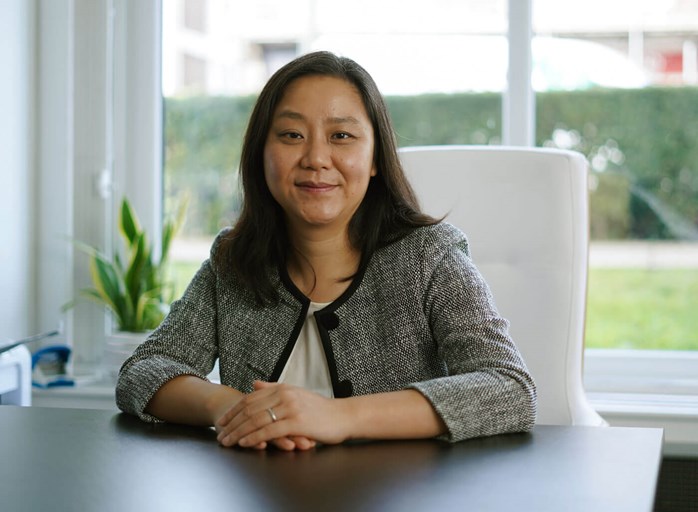Leading independent eye hospital based in Finchley, My-iClinic, has welcomed Consultant Ophthalmologist Ms Yvonne Luo to its growing team of specialists. Ms Luo will help expand the clinic’s portfolio with her vast experience and expertise, particularly in the treatment of retina conditions, which are sadly becoming more common among people of all ages.
In recent years, Ms Luo has seen an increasing number of patients suffering with ‘floaters’ and ‘flashing lights’, two key symptoms which can suggest a ‘torn retina’ and potentially develop into retinal detachment – resulting in vision loss, or even blindness if left untreated. The chances of developing retinal detachment are higher among sufferers of myopia (short-sightedness).
Worryingly, given the link between retinal disorders and myopia, research suggests [1] short-sightedness could reach ‘epidemic’ proportions among children and young people over the next decade. While the exact causes are complex and not completely clear, myopia among children and young people is on the increase, possibly related to environmental factors, such as spending less time outdoors in natural light, combined with excessive amounts of TV and screen-time compared to previous generations.

Ms Luo explains: “The issue with ‘floaters’, in particular, is that you cannot be sure if they are harmless or not, yet patients can sit on waiting lists for weeks or even months for tests and treatment.”
One of the key procedures to treat ‘floaters’, and one of Ms Luo’s specialisms, is a vitrectomy – a type of surgery which removes some of the gel-like fluid in the middle of the eye to improve vision and treat the underlying retinal tears if required. At My-iClinic, this is performed predominantly using ‘27 gauge’ instruments, the smallest of small-gauge vitrectomy instrumentation, resulting in a minimal wound and faster recovery time.
A third of Britons currently have myopia and, according to the National Library of Medicine [2], more than 50% of the world’s population will be myopic by 2050.
Clinic Director, Mr John Bolger, adds: “Myopia is increasing worldwide. More and more children are being forced to turn to glasses or contacts to see and it’s entirely environmental. Twenty-first century lifestyle, which is lived indoors, is making us myopic. This myopia pandemic started before the mobile phone or laptop was invented.”
Research shows the overwhelming cause is the lack of natural daylight in our children’s lives. Already 33% of Britons are myopic, but among children the percentage is even higher. In some schools over half of A-level students are myopic.
Key symptoms which may suggest a torn retina, with the potential to develop into retinal detachment are:
- Floaters – tiny black dots, or shapes like ‘tadpoles’.
- Flashing ‘lights’ – called photopsia, due to traction on the retina.
- Thick shadow or 'curtains' – starting from the periphery of the vision, and can rapidly progress to involve the whole vision.
While older myopia patients are more likely to develop acute and urgent retinal detachment with the above symptoms, there is a cohort of younger myopic patients for whom the symptoms can be much more subtle. Instead of noticing the alarming flashing light, new floaters or 'curtains', they may only notice an area of missing visual field which develop insidiously over a period of time.
As early detection and treatment is the key to successful outcome, it is therefore vital to raise awareness for this age group so they are encouraged to get symptoms checked out as soon as possible, preferably in the first couple of days of experiencing symptoms. If detected early, retinal tears can be treated by localised laser or freezing treatment (laser / cryo-retinopexy), preventing progression to retinal detachment. Once retinal detachment has developed, treatment usually requires a combination of vitrectomy, laser / cryo-retinopexy and a tamponade agent. The success rate of fixing a detached retina with one operation is around 80–90%. A small proportion will need a second surgery.
My-iClinic in North London, offers a comprehensive portfolio of treatments for eye conditions, including: latest laser eye surgery (SMILE, LASIK, Presbyond), cataract surgery, myopia control clinic, ICL eye surgery, eyelid cysts and styes and paediatric eyecare. The clinic also houses a cutting-edge operating theatre.
Clinic Director, Mr John Bolger, says: “We are delighted Ms Luo is joining the team. She will be a valuable addition to our group of skilled ophthalmologists, optometrists, nurses and support workers, all committed to providing the very best – and affordable – bespoke eye health services to patients in North London and the surrounding areas. We’re dedicated to sourcing state-of-the-art diagnostic equipment and ensuring we remain at the forefront of eye care treatment and personalised patient care.”
For more information about treatments and services please visit: www.my-iclinic.co.uk . My-iClinic is situated on 960 High Road, London, N12 9RY.
References
1. https://bmcophthalmol.biomedcentral.com/articles/10.1186/s12886-022-02471-2; https://www.ncbi.nlm.nih.gov/pmc/articles/PMC7237487/; https://www.ncbi.nlm.nih.gov/pmc/articles/PMC10018376/



